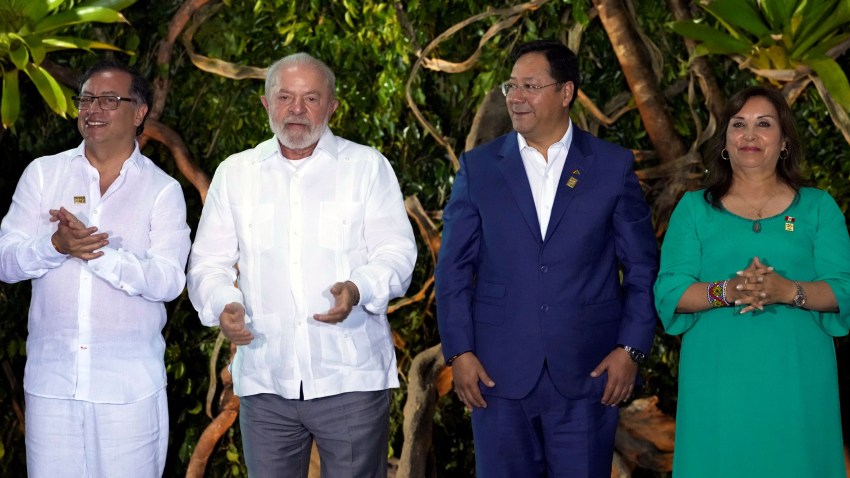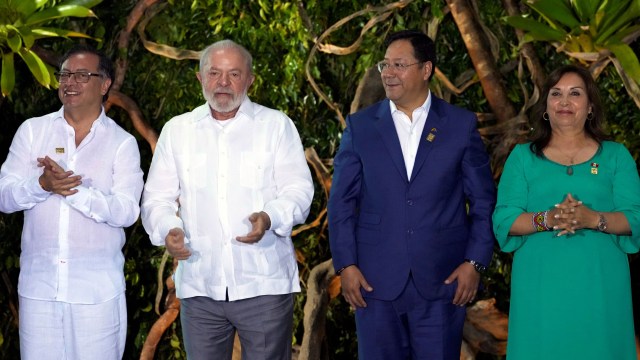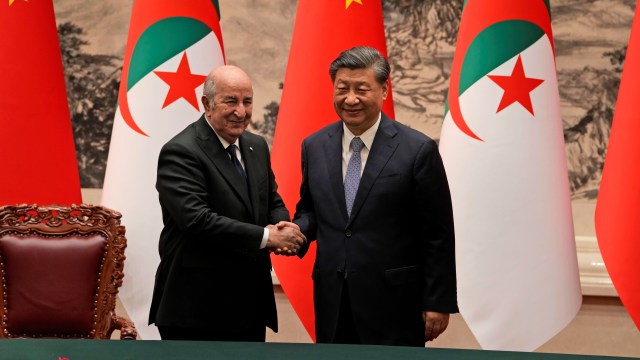Today at WPR, we’re covering the divisions in South America over Amazon deforestation and Algeria’s growing ties to China.
Argentina: Ultra-right-wing libertarian Javier Milei won Argentina’s open presidential primary election Sunday, securing 30 percent of the vote in a surprise showing that makes Milei the front-runner for the presidency ahead of the country’s general election on Oct. 22. (New York Times)
Our Take: Because of the specifics of Argentina’s primary system, Sunday’s vote served not only as a way for parties to choose candidates, but also as a barometer to see which way voters are leaning.
There were plenty of reasons to believe that Milei wouldn’t fare well in the primary. His policy proposals, which include dismantling the central bank and developing a trading market for human organs, are decidedly radical, and a recent corruption scandal caused him to slip to third in many polls. Perhaps most importantly, most polling showed low support for other members of Milei’s party.
Get the Daily Review sent straight to your inbox every weekday.
Nevertheless, Milei outperformed those polls, suggesting that even if he is a one-man show, he’s a one-man show whose growing momentum could give him a real shot to win the presidency. Still, the fact that other members of his party didn’t outperform their polls may be a sign that Milei’s support in the primary came as a result of a protest vote that could shift back to the two main parties in October.
For their part, Argentina’s center-right party chose a hard-right, law-and-order candidate in Patricia Bullrich, while Economy Minister Sergio Massa, the Peronist coalition’s relatively moderate candidate, performed better than expected. Both of their parties tallied combined votes that were within percentage points of Milei, making the presidential contest essentially a three-way toss-up two months ahead of the first round.
The big question going forward is how the market will react to Sunday’s result, and what impact that will have on voters’ choices come October. Four years ago, markets melted down after the primary vote suggested the Peronists would return to power. That ended up cementing their victory, given that the country’s already poor economic conditions had driven voters’ anti-incumbent sentiment. Will the market react similarly to Milei’s performance? And if so, will that give him more momentum, or less, now that voters will have another non-incumbent—Bullrich—to choose from? Perhaps the only clear outcome from Sunday’s voting is that it failed to reduce any of the uncertainty over who Argentina’s next president will be.

Last week’s summit of the Amazon Cooperation Treaty Organization was supposed to bring together leaders of the Amazonian countries in order to find regional solutions to deforestation. Instead, the summit exposed divisions in South America on the topic, with two extremes at odds over how to address the issue.
Sitting in the center of the two extremes? Brazilian President Luiz Inacio Lula da Silva.
Columnist James Bosworth breaks down why that could help Lula build consensus and lead the fight against deforestation of the Amazon:
Protecting the Amazon Is Good Policy, but Difficult Politics
Reducing deforestation in the Amazon is good policy, but as last week’s summit bringing together leaders of the Amazonian countries demonstrated, it can make for difficult politics. Instead of arriving at regional solutions, the summit exposed divisions in South America on a topic that is high on the global environmental agenda. Read more.
After years of isolation, Algeria is making a broad effort to reengage diplomatically with the world. Algerian President Abdelmadjid Tebboune has made trips to Russia, Qatar and Turkey, among other countries, so far this year.
But of all the countries Tebboune has visited recently, China is the friend he really wants. Indeed, as Francisco Serrano writes in today’s briefing, Algiers needs Beijing more than ever.
Algeria’s Renewed Push for Global Engagement Centers on China
Algeria’s recently intensified foreign policy engagement has three main goals: to counter the growing regional influence of neighboring Morocco, strengthen its position among the rising powers of a multipolar world and attract more investment to diversify its economy. Aligning with China fits into all of these goals. Read more.

Question of the Day: Which of the following countries recently volunteered to lead the multinational effort to establish order in Haiti?
Find the answer in the latest WPR Weekly Quiz, then read Alessandro Ford’s briefing on Haiti’s “urban warfare nightmare.”

A prominent Saudi scholar and social media influencer has been arrested by Saudi authorities in what appears to be more evidence of the kingdom’s growing crackdown on social media influencers. The scholar, Mohammed Alhajji, is a public health expert and was seen as apolitical, leading to questions about why he was detained.
The latest crackdown on social media users has focused on arrests made within Saudi Arabia. But in recent years, the kingdom has also shown a pattern of punishing Saudi citizens for their social media usage outside the country’s borders—even in democracies that guarantee free speech. As Nadine Farid Johnson wrote last year, “this transnational policing is a new form of repression, using freely expressed opinions to silence and oppress.”
Saudi Arabia’s Crackdown on Dissent Now Extends Beyond Its Borders
Nov. 10, 2022 | Recent cases make clear that Saudi Arabia, with MBS in charge, is willing to extend its violations of human rights to democratic countries. Read more.
*****
Tanzanian police arrested a lawyer and an opposition politician Saturday, accusing them of planning to organize a nationwide protest aimed at bringing down the government.
In her two years in power, President Samia Suluhu Hassan has implemented a domestic reform agenda that has marked a sharp departure from her predecessor, who cracked down harshly on the opposition and civil society.
Still, as Nicodemus Minde wrote in May, Samia has failed to institutionalize many of her reforms, making them vulnerable to backsliding, as these arrests demonstrate:
To Restore Tanzania’s Democracy, Samia Must Solidify Her Reforms
May 31, 2023 | President Samia Suluhu Hassan has sought to repair Tanzania’s democracy and reboot its foreign policy. Read more.
That’s all for today’s Daily Review. Coming up, we’re covering Iran’s relations with Afghanistan under the Taliban and the security crisis in Ethiopia’s Amhara region.
Have a great day,
Jakob Cansler
More From WPR
- Alessandro Ford on Haiti’s security crisis.
- Paul Poast on the Jan. 6, 2021, attack on the U.S. Capitol.
- Federica Rossi on the latest chapter in a decades-old France-Italy dispute.
- Frida Ghitis on Myanmar’s partial pardon of Aung San Suu Kyi.



